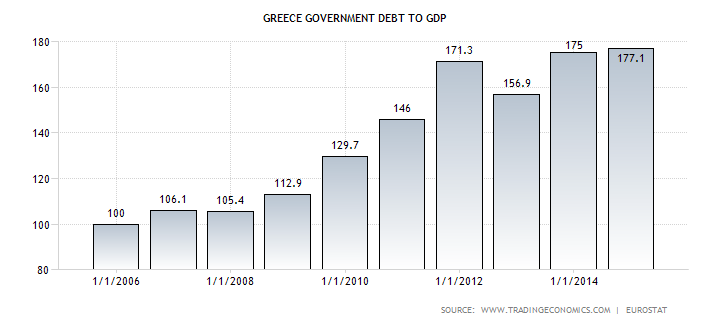Stocks soared in ebullient fashion on Monday as an 11th hour deal between Greece and its European creditors was finally hammered out after three weeks of brinksmanship. The deal amounts to a full surrender by Athens, just one week after its people voted "Oxi" against more austerity in a surprise referendum.
This is the third deal since the Greek debt crisis started in late 2009, for those keeping track at home. And this time, in exchange for merely the consideration of a new bailout package worth about $100 billion, Greece must submit and pass a long list of measures by Wednesday — including, embarrassingly, putting $55 billion worth of state assets into a privatization fund. In other words, Greece is getting a visit from the repo man.
It gets worse. And that's why, despite investor enthusiasm, Wall Street analysts are pooh-poohing the deal. The Greek debt drama appears far from over.
Related: Why Greece Can’t Grow Its Way Out of This Mess
The crux of the problem, as outlined in an analysis of Greek debt sustainability strategically released in early July by the International Monetary Fund, is that Greece simply cannot work its way out of indebtedness — let alone an additional $100 billion should Sunday night's deal go through. It needs debt relief via a lengthening of bond maturities at a bare minimum.
On this front, Eurozone hardliners carried the day. The Euro Summit statement "stresses that nominal haircuts on the [Greek] debt cannot be undertaken" and that past bailout programs "adopted a remarkable set of measures supporting Greece's debt sustainability."
In other words, the Euro leaders feel it's Greece's responsibility to embrace further budget austerity and economic reforms in the context of an economy that's still in the maw of a six-year-old depression amid a 50 percent youth unemployment rate.

Greek banks, which have been closed for two weeks, remain shuttered with Wednesday seen as the soonest they will get increased liquidity support from the European Central Bank to reopen. Capital controls, including limits on deposit transfers, are expected to remain in place. Greek Prime Minister Alexis Tsipras could very well face popular protests and political infighting over the next 48 hours.
Even if all this is avoided, any deal would need to pass parliaments in Germany and Finland, where anti-bailout resistance has been growing.
Related: For Greece, the Self-Inflicted Wounds of a Careless Country
No wonder then that so many Wall Street analysts came out against the deal Monday.
Goldman Sachs analysts, while noting the pre-deal announcement is a positive surprise in the near term, have two main concerns. The first is residual implementation risks as politicians on both sides get their say. The second is that this merely amounts to more of the same — fiscal austerity and debt deflation — and will continue to reveal the structural flaws of the Eurozone. Budget cuts will further slow economic growth, worsening Greece’s deficit and increasing its funding needs. It's the nightmare of Sisyphus enacted on an entire country.
Deutsche Bank believes Greece is headed for a new election in September in which the political battle will not be over who is for or against austerity measures, but instead who is for or against a return to the drachma and an exit from the Eurozone. Furthermore, because of the need for bank recapitalizations, a depositor "bail in" cannot be ruled out.
Bank of America Merrill Lynch warns that after the over-the-weekend discussion of a "Grexit" by the Germans, an exit from the Euro is now in their mind officially something that can used as a threat against countries that don't toe the line on German-style fiscal discipline. The Merrill analysts also note that execution risks on this pre-deal announcement remain high and it, if passed, will only further increase pressure on the Greek economy.
And further out on the horizon, they worry about all of this leading to the creation of more vehement anti-euro parties within Greece. After all Greece has suffered through, it's time to push back.
Top Reads from The Fiscal Times:






